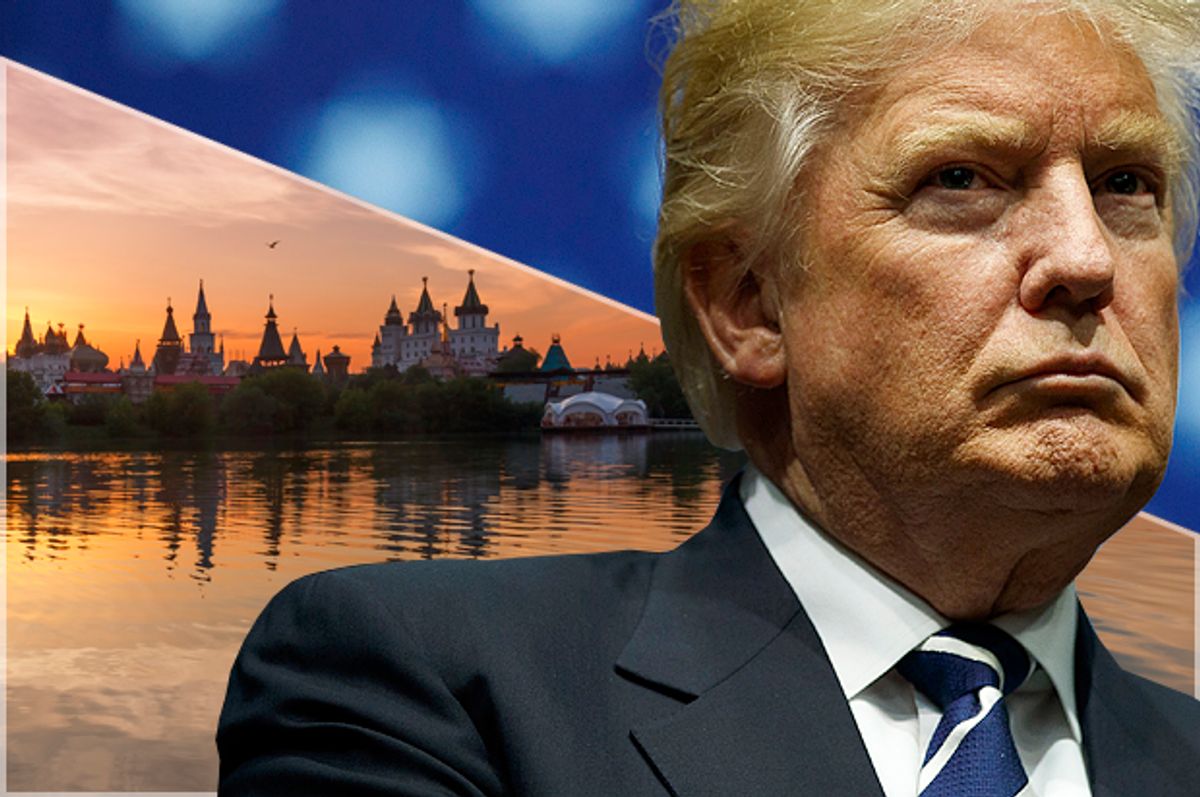Did Vladimir Putin direct Russian spies and other agents to interfere in the 2016 American presidential campaign to benefit the Republican nominee Donald Trump? The evidence strongly suggests that the answer is yes.
Were some of Trump's advisers in close contact with Russian agents during the 2016 campaign? Was money transferred to Trump's representatives by Russian agents with the goal of manipulating Donald Trump? We don't know, but the FBI, CIA, National Security Agency and the Treasury Department are actively investigating that possibility.
Do Putin and his spies have a dossier of information on Donald Trump that could potentially be used to blackmail or otherwise manipulate the 45th president of the United States? That scenario remains unproved but seems more likely than not, especially considering Trump's unexplained and uncharacteristic tendency to lavish praise on Putin and indications that the new president and members of his Cabinet and inner circle have financial connections to Russia.
But in the midst of all this controversy, one thing is abundantly clear: Donald Trump's political strategy is torn directly out of Russia and Vladimir Putin's playbook.
Writing at Small Wars Journal, Roman Skaskiw has highlighted the following core principles of Russian propaganda:
- Rely on dissenting political groups in Western countries for dissemination.
- Domestic propaganda is most important.
- Destroy and ridicule the idea of truth.
- "Putin is strong. Russia is strong."
- Headlines are more important than reality, especially while first impressions are forming.
- Demoralize.
- Move the conversation.
- Pollute the information space.
- Gas lighting — accuse the enemy of doing what you are doing to confuse the conversation.
Trump and his spokespeople appeal to "alternative facts," employ fake news and other forms of disinformation, exploit and amplify dissent between the Hillary Clinton and Bernie Sanders factions of the Democratic Party and deploy Orwellian Newspeak.
The Trump team promotes a dystopian and apocalyptic vision of America where only the Great Leader with his supposed strength and virility can successfully intervene, and displays blatant disregard for its campaign promises. Trump's people use Twitter and other social media to cause controversy and distraction, as well as to spread bullying behavior and insults, threats of violence against his political rivals, militant nationalism and conspiracy theories about "illegal" voters. All of this represents a direct application of Russian propaganda strategies to American politics.
Donald Trump and Vladimir Putin are authoritarian leaders who at the very least flirt with overt fascism. Their strategy for manipulating the public and news media would not be effective, however, if a pre-existing superstructure was not already in place. In the United States, this takes the form of a right-wing news-entertainment system that is anchored by Fox News and whose tendrils include talk radio and a vast internet propaganda operation. Trump's use of Russian propaganda techniques is also made viable because of a nationwide decline in critical thinking skills, coupled with a 20-year growth in authoritarian values among conservatives, right-leaning independents and Republicans.
Writing at Granta, Peter Pomerantsev offered troubling insights about the political synergy between Trump's movement and Putin. He concluded discussing the propaganda failures of earlier generations:
But for all their cynicism, the spin doctors and political technologists were, at this point, still trying to pull off an illusion of the truth. Their stories were meant to be coherent, even if they were low on facts. When reality caught up — the audience caught on to the illusion in Moscow and the stories about Iraq broke down and the stock market crashed — one reaction has been to double down, to deny that facts matter at all, to make a fetish out of not caring about them. This has many benefits for rulers — and is a relief for voters. Putin doesn’t need to have a more convincing story, he just has to make it clear that everybody lies, undermine the moral superiority of his enemies and convince his people there is no alternative to him. "When Putin lies brazenly he wants the West to point out that he lies," says the Bulgarian political scientist Ivan Krastev, "so he can point back and say, 'but you lie too.'" And if everyone is lying then anything goes, whether it’s in your personal life or in invading foreign countries.
This is a (dark) joy. All the madness you feel, you can now let it out and it’s okay. The very point of Trump is to validate the pleasure of spouting shit, the joy of pure emotion, often anger, without any sense. And an audience which has already spent a decade living without facts can now indulge in a full, anarchic liberation from coherence.
As many commentators have observed, Donald Trump is temperamental, narcissistic, extremely emotional, impulsive, attention-seeking and, in total, a man-child demagogue. Those traits, however, are coincidental and secondary to Trump's concerted (and, to this point, highly successful) application of Putin's strategies to American politics. Trump and his apparatchiks lie about matters both small and large because lying is their strategy: These are not gaffes or errors but rather central features of Trump's approach to obtaining and expanding political power. American news media organizations, with the recent exception of The New York Times, has been reluctant to directly accuse Trump of lying because they don't want to be denied access to the White House and because they fear his threats to punish news outlets that are not sufficiently deferential.
American exceptionalism is dead (once again) and Donald Trump helped to kill it. He has perverted and "Putinized" American politics, all while promising to "Make America Great Again." The irony is ugly and profound.

Shares